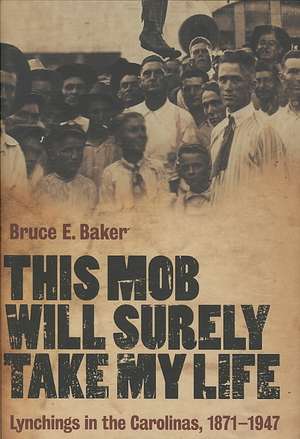This Mob Will Surely Take My Life: Lynchings in the Carolinas, 1871-1947
Autor Bruce E. Bakeren Limba Engleză Hardback – 14 ian 2009
Preț: 322.30 lei
Preț vechi: 531.37 lei
-39% Nou
Puncte Express: 483
Preț estimativ în valută:
61.68€ • 64.16$ • 50.92£
61.68€ • 64.16$ • 50.92£
Carte tipărită la comandă
Livrare economică 14-28 aprilie
Preluare comenzi: 021 569.72.76
Specificații
ISBN-13: 9781847252388
ISBN-10: 1847252389
Pagini: 256
Ilustrații: 20
Dimensiuni: 156 x 234 x 23 mm
Greutate: 0.54 kg
Editura: Bloomsbury Publishing
Colecția Continuum
Locul publicării:London, United Kingdom
ISBN-10: 1847252389
Pagini: 256
Ilustrații: 20
Dimensiuni: 156 x 234 x 23 mm
Greutate: 0.54 kg
Editura: Bloomsbury Publishing
Colecția Continuum
Locul publicării:London, United Kingdom
Caracteristici
Recent events in the US â?" particularly in Jena, Louisiana â?" and the resulting furore show that this is still an open wound in the American psyche.
Notă biografică
Bruce E. Baker is Lecturer in American History at Newcastle University, UK. He is author of What Reconstruction Meant: Historical Memory in the American South and After Slavery: Race, Labor and Citizenship in the Reconstruction South.
Cuprins
Introduction1: Reconstruction Violence and the Foundations of the Lynching Era: Union, S.C., 18712: Black Politics and Lynching after Reconstruction: Giles Good, York, S.C., 18873: Rape and Lynching in the New South: Manse Waldrop, Central, S.C., 18874: North Carolina's Turn Against Lynching: J. V. Johnson, Wadesboro, N.C., 19065: Lies and Lynching: Richard Puckett, Laurens, S.C., 19136: A Wartime Lynching: Rev. Watson T. Sims, Sharon, S.C., 19177: A Disgrace to North Carolina: Oliver Moore, Tarboro, N.C., 1930 Conclusion
Recenzii
Mention -Book News, February 2009
"By focusing on seven discreet incidents Baker makes the pattern of lynching in one part of the American South concrete and grounded in the social world that black and white southerners fashioned together. In this light, This Mob Will Surely Take My Life becomes a good starting point for an assessment of the relationship of mob violence to racial politics in the postemancipation South and North Carolina."-The Journal of American History, Dennis B. Downey, Millersville University, Millersville, PA
This Mob Will Surely Take My Life is a major addition to the literature on collective violence in the post-Civil War South. Through these well-researched case studies, the author succeeds in tracing the rise and decline of lynch law in the Carolinas, proving in the process how its persistence and pervasiveness negatively affected both races and all levels of society for more than three-quarters of a century.
"By focusing on seven discreet incidents Baker makes the pattern of lynching in one part of the American South concrete and grounded in the social world that black and white southerners fashioned together. In this light, This Mob Will Surely Take My Life becomes a good starting point for an assessment of the relationship of mob violence to racial politics in the postemancipation South and North Carolina."-The Journal of American History, Dennis B. Downey, Millersville University, Millersville, PA
This Mob Will Surely Take My Life is a major addition to the literature on collective violence in the post-Civil War South. Through these well-researched case studies, the author succeeds in tracing the rise and decline of lynch law in the Carolinas, proving in the process how its persistence and pervasiveness negatively affected both races and all levels of society for more than three-quarters of a century.











